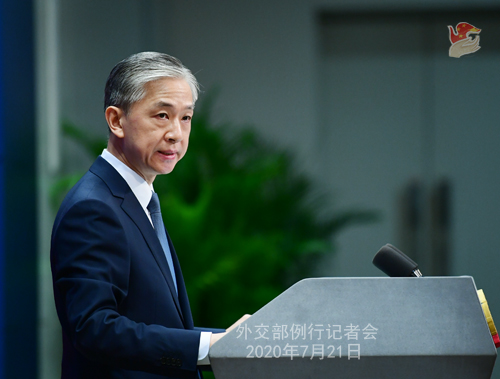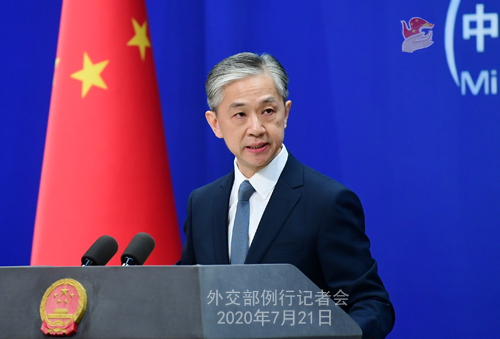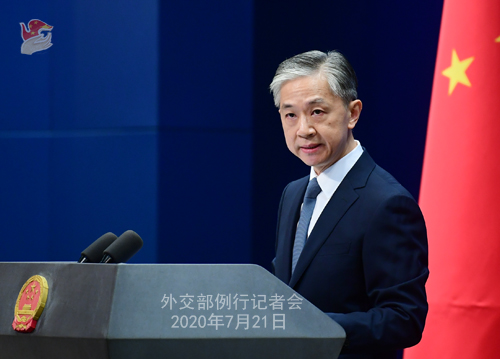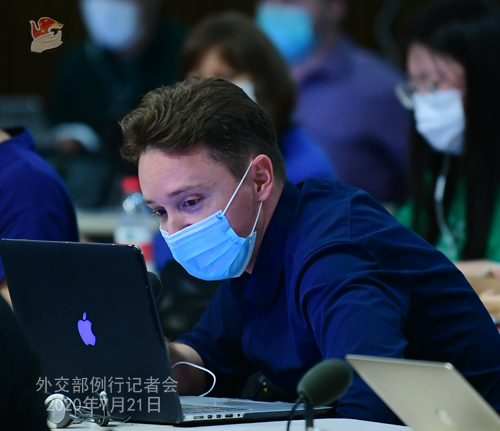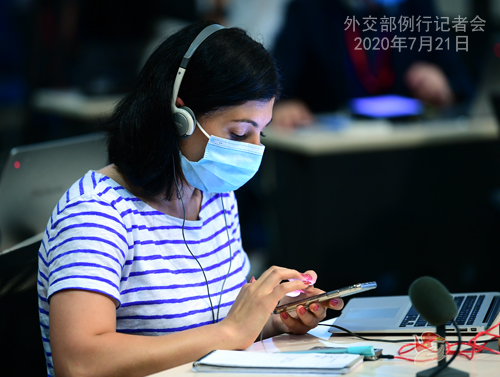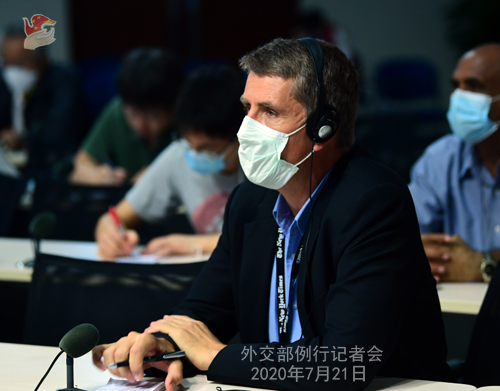| Foreign Ministry Spokesperson Wang Wenbin's Regular Press Conference on July 21, 2020 |
| 2020-07-21 22:36 |
|
CCTV: Addressing the China Business Summit on July 20 in Auckland, Prime Minister Jacinda Ardern said that "China is New Zealand's largest trading partner and one of our most important relationships". In the face of COVID-19, the two sides should continue strengthening cooperation in such areas as free trade, business environment, climate change and public health. At the same time, she said that the New Zealand government expressed concerns on issues concerning Hong Kong, Xinjiang and human rights. Would you like to comment on her remarks? Wang Wenbin: We note relevant reports and appreciate the remarks which show that the New Zealand government attaches importance to developing relations with China. China and New are each other's important partners for cooperation. Sound and steady development of bilateral relations serves the fundamental interests of both countries and peoples. Under current circumstances, China stands ready to work together with New Zealand under the principle of mutual respect, equality and mutual benefit to strengthen mutual trust and cooperation, contribute to global efforts to fight the pandemic and promote economic recovery, and realize new progress in our comprehensive strategic partnership. I need to stress that we stand firmly against foreign interference in China's domestic affairs under the pretext of Hong Kong, Xinjiang or human rights. China is resolutely determined to safeguard its sovereignty, security and development interests. AFP: A Malawi court on Monday jailed 7 Chinese nationals for illegal possession of ivory and pangolin scales. Does China have any comment? Did China collaborate with Malawi on this case? Wang Wenbin: I noted relevant reports. As a principle, the Chinese government always asks Chinese citizens abroad to comply with local laws and regulations. It will never shelter any Chinese citizen who breaks the law in other countries, but at the same time requires relevant country to enforce law fairly and ensure the safety and legal rights of Chinese citizens. China attaches great importance to the protection of endangered wild fauna and flora and has been strictly fulfilling its international obligations under the Convention on International Trade in Endangered Species of Wild Fauna and Flora (CITES). The Chinese government has zero tolerance for illegal trade in endangered wild fauna and flora and their products and is resolute in punishing relevant offenders in accordance with law. China stands ready to continue its work with other members of the international community to protect endangered wildlife and crack down on illegal trading. New York Times: Do the Central People's Government and the HKSAR government intend to use Article 38 of the national security law to prosecute residents of other countries for activities taking place in other countries that affect China's national security? If so, how does it differ from the US long-arm jurisdiction that the Foreign Ministry criticized? Wang Wenbin: Article 38 of the Law of the People's Republic of China on Safeguarding National Security in the Hong Kong Special Administrative Region stipulates the principle of protective jurisdiction, which is necessary for effectively cracking down on crimes that endanger national security and safeguarding China's national security and the security of the HKSAR. This is also a common practice of many countries, including the US. It has fundamental difference from the US long-arm jurisdiction which oppresses foreign entities and individuals without cause.
ITV: The British Government went ahead with the suspension of the extradition treaty between the UK and Hong Kong and introduced a ban on arms sales. What is your response on that? There has been suggestion that by doing that, Britain has breached international law. Can you explain how they've done that? Wang Wenbin: The UK's erroneous remarks and moves on Hong Kong are a serious breach of international law and basic norms governing international relations and gross violation of China's internal affairs. We firmly oppose them and reserve the right to react further. Hong Kong affairs are China's internal affairs that allow no foreign interference. The Chinese government is determined to defend national sovereignty, security and development interests, to implement "one country, two systems" comprehensively and faithfully, and to oppose foreign interference in Hong Kong affairs. Intervening and pressuring tactics will never work on China. We urge the UK to wake up from its colonial dream, correct its mistake immediately and stop interfering in China's internal affairs to avoid further damage to China-UK relations. CRI: China and Cambodia yesterday announced the conclusion of China-Cambodia free trade agreement talks. How do you view the significance of the FTA in China-Cambodia relations? What will it bring to the people in both countries? Wang Wenbin: China and Cambodia are friendly neighbors and iron-clad friends. This year marks the 10th anniversary of the establishment of China-Cambodia comprehensive strategic cooperative partnership and the one-year anniversary of the signing of the action plan for building a community with a shared future for the two sides. Following the consensus reached by leaders in both countries, we conducted FTA talks and soon reached agreement, demonstrating high-level political mutual trust and deep foundation for cooperation. The FTA covers BRI cooperation, trade in goods and services, investment, economic and technological cooperation and e-commerce. It will help the two countries further open up bilateral trade and investment, bringing greater tangible benefits and development opportunities for the two peoples. China and Cambodia have all along been supporting free trade and multilateralism while opposing protectionism and unilateralism. We believe that this FTA, after its official signing, will inject new impetus into the quality building of the BRI and the China-Cambodia community with a shared future, and contribute to a stabilized supply and industrial chain, regional economic recovery and an open world economy. BBC: A follow-up on the UK decision regarding the Hong Kong extradition, you said that it is a breach of international law. China's Ambassador to the UK also said that regarding the decision. Could you tell us which law China believes that the UK is in breach of? Wang Wenbin: I took the same question yesterday. I would like to reiterate that we oppose the UK's interference in Hong Kong affairs and China's other internal affairs, which is in breach of international law and basic norms governing international relations. RIA Novosti: US President Trump's reelection campaign ran Facebook ads this weekend claiming that Chinese-owned video app TikTok is spying on users. Do you have comment on this? Wang Wenbin: Such allegation is totally groundless.
AFP: Reports say that China has deployed fighter jets in the Yongxing Island. It that true? Do you have more details? Wang Wenbin: The Xisha Islands are China's territory. China's national defense development in its own territory is within its sovereignty. Macao Monthly: Russian President Putin proposed to hold a P5 summit in the near future. Has China talked to other UNSC permanent members about this? Any progress made so far? Wang Wenbin: This year marks the 75th anniversary of both the victory of the World Anti-Fascist War and the founding of the United Nations. In-depth communication and stronger coordination and cooperation among P5 countries on the international landscape and major international issues is essential to upholding multilateralism, the post-war international order, the authority of the UN and the Security Council, as well as regional and international peace and stability. China supports Russia's initiative to hold a P5 summit. We are in coordination with Russia regarding the specific arrangements and are ready to keep in contact with other UNSC permanent members. Beijing Daily: The Civil Aviation Administration of China, the General Administration of Customs and the Ministry of Foreign Affairs jointly issued a notice today, asking passengers on flights arriving in China to provide negative COVID-19 test results before they board. I wonder what is your consideration behind this new move? Wang Wenbin: Nucleic acid testing is the primary approach to test COVID-19 widely recognized by all countries. As the epidemic situation in some countries is put under control or getting better, countries are gradually resuming people-to-people exchange and international flights. To ensure safety in international travels and reduce the risk of cross-border transmission, and based on other countries' practices, passengers on China-bound flights from certain countries are required to provide negative nucleic acid test results and this meausre will then be expanded to cover more countries. This measure is conducive to cross-border flows of people, the resumption of work and production in all countries, and the restoration of order in people-to-people exchange. Follow-up: How does China plan to implement this measure? Wang Wenbin: Chinese and foreign passengers taking flights to China should complete their nucleic acid tests within five days prior to their boarding date. The airlines will check passengers' testing results when they board the plane. The Chinese embassies overseas will carefully evaluate the host countries' nucleic acid testing capabilities and other related conditions, and confirm the time of implementation based on full consultation and agreement reached with the host countries. The specific arrangements on implementation will be released by our embassies.
South China Morning Post: The Chinese side said that State Councilor and Foreign Minister Wang Yi and Vietnam's Deputy Prime Minister and Foreign Minister Pham Binh Minh will co-chair the China-Viet Nam Steering Committee for Bilateral Cooperation today. has this meeting concluded? What did the two sides talk about? Any latest developments regarding the South China Sea? Wang Wenbin: I announced information about this meeting yesterday, and we will give you timely updates on the meeting. Please stay tuned. BBC: The Board of Deputies of British Jews has written to Ambassador Liu Xiaoming following his interview over the weekend on BBC. The letter recognizes the achievements China has made in recent years but makes a comparison between the treatment of Muslims, especially Uyghurs in Xinjiang with the treatment of Jews in WWII. Do you have any response to that letter? Wang Wenbin: I'm not aware of the letter thing you mentioned. I would like to reiterate that the issue concerning Xinjiang is never about human rights, religion or ethnicity, but about fighting terrorism and separatism. Comparing the situation in Xinjiang to the past sufferings of the Jewish people is just ludicrous. Xinjiang affairs are purely China's domestic affairs where no country has any right or is in any position to interfere. The Chinese government is firmly determined to defend national sovereignty, security and development interests, to fight terrorist, separatist and religious extremist forces, and to oppose foreign interference in China's Xinjiang affairs. Reuters: The US Department of Commerce has added another 11 Chinese companies to its black list of entities, saying that they are implicated in human rights violations connected to China's treatment of Uyghurs in Xinjiang. Do you have any comment on this? Wang Wenbin: Under the pretext of "human rights", the US has abused export restriction measures and put those Chinese companies on its entity list. China firmly opposes this practice as it violates the basic norms governing international relations, interferes in China's internal affairs and undermines China's interests. The US cares nothing about "human rights". Its true intention is to oppress Chinese companies, disrupt stability in Xinjiang and slander China's Xinjiang policy. The international community knows that very clearly. We urge the US to correct its mistakes, withdraw this decision and stop intervening in China's domestic affairs. China will continue taking all necessary measures to safeguard our companies' legitimate rights and interests. BBC: Not so long ago, the UK and China were talking about "a golden age of China-UK relations". Would you say that now that expression can be accurately used to talk about the state of relations between China and the UK at the moment? Wang Wenbin: Relations between countries should be based on mutual respect, especially with regard to core interests and major concerns, equality and mutual benefit. At the same time, non-interference, a basic norm in international relations, should also be observed. When it comes to China-UK relations, actions matter, not words.
China Review News: The Office of Russia's Prosecutor General yesterday added seven Falun Gong organizations to the list of unwanted organizations on July 20, saying that their activities jeopardize Russia's security. On the same day, US Secretary Pompeo released a statement titled "21st Anniversary of the PRC Government's Persecution of Falun Gong" on the website of the Department of State. I wonder if China has any comment on the above? Wang Wenbin: Falun Gong is a cult outlawed by the Chinese government. It's anti-society, anti-science, and anti-humanity. Russia made the decision to add seven Falun Gong organizations to its list of unwanted organizations and ban their activities. We welcome and appreciate it. As to Pompeo's statement, I must point out that, to attack and smear China, Pompeo had no scruples about colluding with a cult like Falun Gong. This is indeed a despicable new low for him. China Youth Daily: China recently suspended frozen shrimp import from some Ecuadorian companies after samples taken from their packaging surface and container internal walls tested positive for COVID-19. We learned that China and Ecuador held consultations over this and reached some consensus. Could you share some details? Wang Wenbin: The virus is an enemy of all mankind. Since COVID-19 broke out, China, Ecuador and other countries have taken active prevention and control measures to safeguard people's life and health. While continuing prevention and control efforts on an ongoing basis to guard against resurgence, countries are striving to resume work and production so as to bring socioeconomic development back to the right track. Not long ago, China's competent authorities took measures to restrict import from a few Ecuadorian companies whose frozen shrimp shipment's packaging surface and container internal walls tested positive for COVID-19. The decision is made out of prevention and control needs and aims to ensure import food safety for people's health. Relevant measures are in full accordance with the "COVID-19 and food safety: guidance for food businesses" formulated and released jointly by WHO and the UN's Food and Agriculture Organization (FAO). The legitimate concerns of Ecuador has also been taken into full consideration. The measures only apply to the few businesses mentioned above while other companies' export to China remains unaffected. Lately the Chinese and Ecuadorian sides have been in close communication through various channels. Multiple rounds of consultations have been held between the competent departments on both sides in a friendly and science-based manner regarding the resumption of the Ecuadorian businesses' export certificate, and positive progress has been made. It has been agreed that a working mechanism will be established to discuss measures to address the problem and see to their enforcement. Once certain conditions are met, relevant companies will be able to resume frozen shrimp export to China, which will promote the sound growth of China-Ecuador food trade. Global Times: European media are reporting that China's Ministry of Commerce is considering retaliating against European companies like Nokia and Ericsson should European Union members follow the lead of the US and UK in barring Huawei from 5G networks. Can you confirm this? Wang Wenbin: It was groundless rumor and malicious fake news. If you trace the European reports to their origin, you'll end up with a Wall Street Journal story quoting so-called "sources". The sole purpose of fabricating such fake news is to sabotage the good cooperation between China and Europe. I would like to reiterate that China's position on 5G is consistent and clear. China's 5G market is open to global telecom companies including European ones like Nokia and Ericsson, who have already won the bid in Chinese projects. We oppose the erroneous practice of stretching the national security concept and defying international trade rules to exclude certain companies of particular country. We also hope that European countries will provide a fair, just, open and non-discriminatory business environment for Chinese companies. BBC: I think you mentioned earlier that following Britain's decision regarding the extradition, China reserves the right to respond. Does that mean that there won't necessarily be a response? Or will there definitely be some sort of retaliation from the Chinese side? How should we describe it? Wang Wenbin: China will fight back against the erroneous moves by the British side.
|
| |||||||||||||||
|
|||||||||||||||


